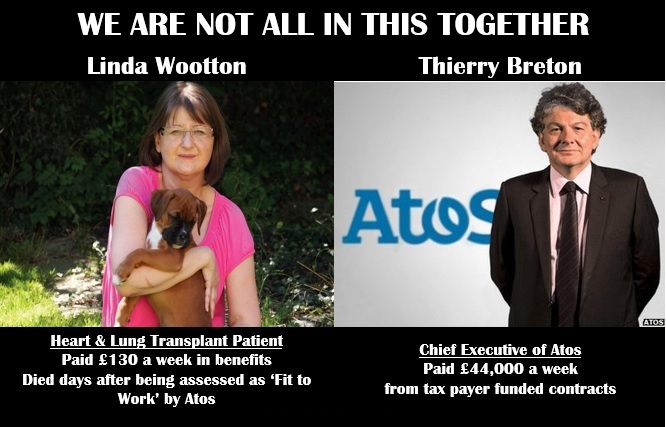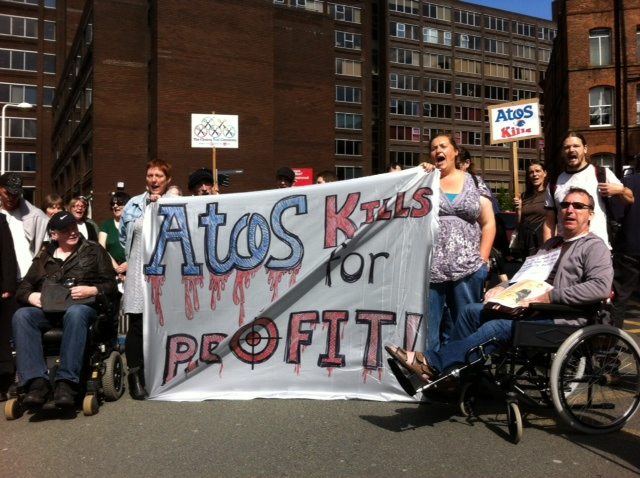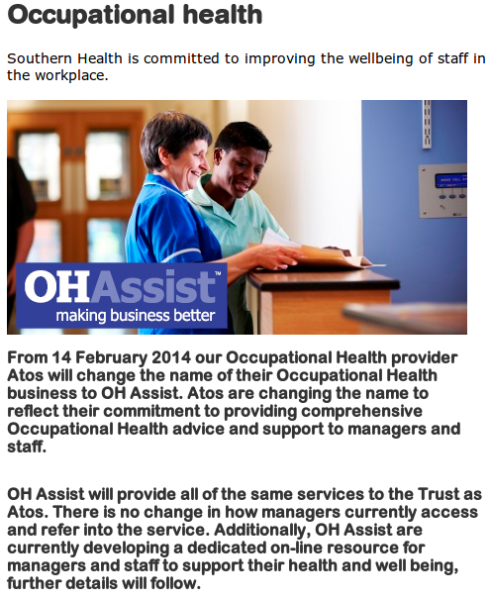

Atos Healthcare ended up at the centre of a major public controversy in the UK as a result of its provision of Work Capability Assessment (WCA) services for the Department for Work and Pensions (DWP).
"In another case, a woman with stage 4 cancer, who was suffering from hair loss undergoing chemotherapy, was told she was also able to get a job, and had her benefits slashed."Thousands of vulnerable people were found to have been wrongly judged to be fit for work and ineligible for government support. In one case, a dying father, 34, diagnosed with emphysema was told that because he could "push an empty box" he was "fit for work". In another case, a woman with stage 4 cancer, who was suffering from hair loss undergoing chemotherapy, was told she was also able to get a job, and had her benefits slashed.
In 2013, Greg Wood, a former navy doctor decided that he could no longer tolerate working for the company and blew the whistle on practices within Atos after he was asked to change a report he had made on a claimant, in this case making it unlikely that the individual would be eligible for sickness benefit.
Wood left because he considered that the company was acting unethically by putting pressure on a doctor to change the conclusions of an assessment.
"Wood left because he considered that the company was acting unethically by putting pressure on a doctor to change the conclusions of an assessment."His decision to spill the beans made headlines in the UK because he was the first Atos-employed doctor to put his career on the line and articulate concerns about a system that had been criticised by charities and claimants for years.
Wood gave strong evidence to the BBC to suggest that the methods used to assess whether individuals were eligible for the new incapacity benefit - employment and support allowance (ESA) - were "unfair" and "skewed against the claimant".
The DWP’s own statistics revealed that in 2011 10,600 people died within six weeks of being found fit for work by Atos and another 2,200 died before their assessment was complete.
"The DWP’s own statistics revealed that in 2011 10,600 people died within six weeks of being found fit for work by Atos and another 2,200 died before their assessment was complete."It was reported that the Government had refused to publish statistics for 2012/2013 and had rejected a Freedom of Information request submitted by Mike Sivier of the Vox Political blog on the grounds that was ‘vexatious‘.
However, following a ruling by the Information Commissioner’s Office in April 2015, the DWP released statistics which revealed that, during the period December 2011 and February 2014, 2,380 people died after their claim for employment and support allowance (ESA) ended because a work capability assessment (WCA) found that they were found fit for work.

Dodgy health assessments by Atos led to widespread outrage and protests in the UK
"...2,380 people died after their claim for employment and support allowance (ESA) ended because a work capability assessment (WCA) found that they were found fit for work."However, as of October 2016 Atos was still undertaking work for the DWP in assessing Personal Independence Payment applications.
When Atos took over administering PIPs its estimates of how fast claims could be processed were over-optimistic as were estimates of how easily claimants could get to assessment centres. This led to delays in assessments, distress to claimants and unexpectedly high costs and to accusations that Atos had misled the government over its capabilities for processing claims.
In 2017 revelations that Atos and Capita were on target to be paid more than €£ 700m for their five-year PIP contracts, and significantly more than the original estimate of €£€ 512m, led to accusations that the DWP was "rewarding failure".
In December 2015, a report by the parliamentary Public Accounts Committee singled out Atos for its failure to show "an appropriate duty of care to the taxpayer" over an IT system designed to allow the extraction of data from all GP practice computer systems in England. The costs of the system, which started five years late, ballooned from an initially estimated €£€ 14m to a final total of €£ 40m.
"The costs of the system, which started five years late, ballooned from an initially estimated €£€ 14m to a final total of €£ 40m."As a result of this "IT cockup", the Public Accounts Committee urged the Cabinet Office to review Atos’s relationships as a Crown supplier, and to ensure the reasons for the project’s failure were "disseminated widely to reinforce the steps that need to be taken to avoid such mistakes being repeated again".
In December 2016, Liberal Democrat leader, Tim Farron questioned how Atos and Capita could have been paid over €£500m from tax payers money for assessing fitness to work in view of the fact that 61% who appealed won their appeals.
Farron stated, “This adds to the suspicion that these companies are just driven by a profit motive, and the incentive is to get the assessments done, but not necessarily to get the assessments right. They are the ugly face of business.”

If your reputation is in shreds, it may be time to rebrand…
"One positive outcome finally emerged from the Atos Healthcare saga in April 2017 when the Scottish government adopted legislation prohibiting the use of private firms for carrying out benefit assessments in Scotland."Social Security minister Jeane Freeman declared that profiteering companies had no place in assessing a person’s fitness to work:
"One of our fundamental principles is that profit should never be a motive nor play any part in assessing or making decisions on people’s health and eligibility for benefits."
In the next part we will return to Thierry Breton and explore some of his connections with the upper echelons of French plutocracy. ⬆